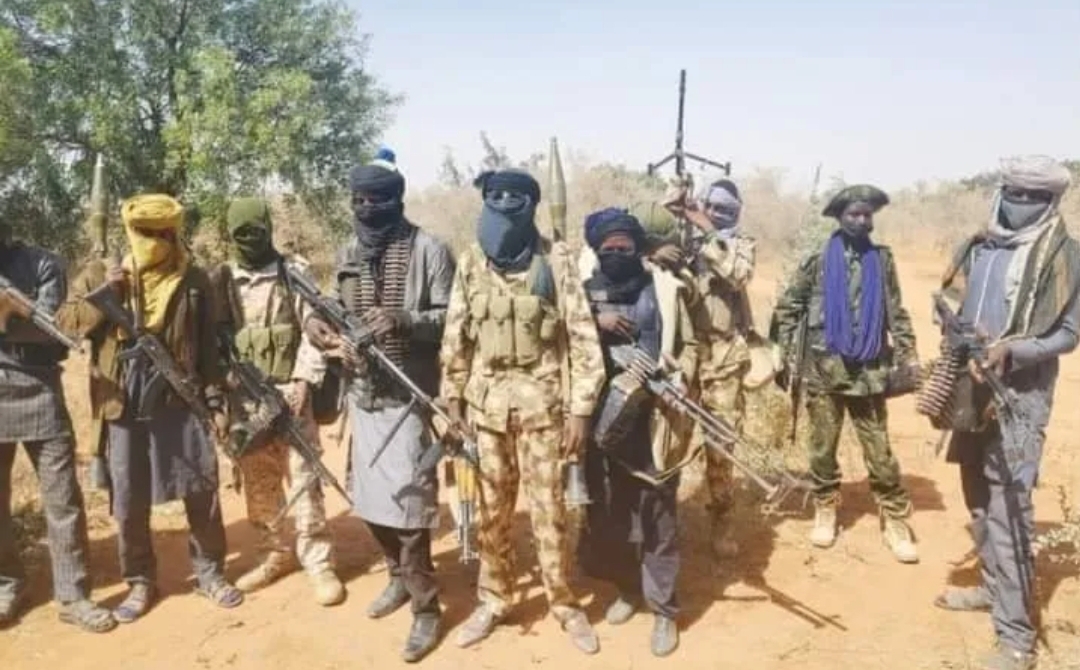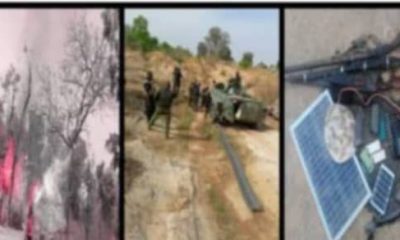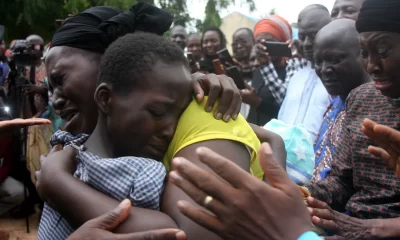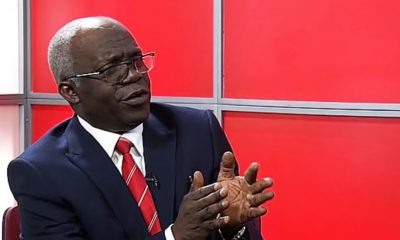Comments and Issues
Insecurity: Terrorists, bandits dictate affairs of Nigerians
Published
2 years agoon
By
Publisher
By Ehichioya Ezomon
Due to insecurity in Nigeria, President Muhammadu Buhari is perceived as unqualified to lecture on security. But he’s good at it the other day on the global stage in Liberia.
Buhari spoke in the capital, Monrovia, and advised leaders, especially of the West African sub-region, and the African continent, to avoid actions that warrant unlawful change of governments by anti-democratic forces.
Being a major player in coup-making – an enterprise he benefited from as Head of State from December 1983 to August 1986 – Buhari knew what he’s talking about.
Buhari had joined other world leaders to commemorate the 175th Independence Anniversary of Liberia that Nigeria had helped rescue from warlords that plunged the country into a devastating civil war from 1989 to 1997.
Focusing on West African leaders, Buhari relished his “democratic credentials,” and warned against conducting elections that breach “trust, freedom and transparency.”
His words: “I would like to use the opportunity of this event to address an important issue affecting three countries in the ECOWAS region: Liberia, Nigeria and Sierra Leone.
“All the three nations have National Elections in 2023. In Nigeria, we are working towards a free, fair, transparent, credible and acceptable outcome of elections and their results.
“It is important and necessary for all our countries to key into these resolves as they are indispensable to peace and stability in our countries and sub-region.
“The deepening of democracy and good governance are essential antidotes to check-mate unconstitutional change of governments as we sadly witnessed within the last three years in three countries within our sub-region.”
Ironically, back home in Nigeria, the opposition members of the National Assembly (NASS) were plotting a palace coup of sorts against the president via an impeachment.
When on July 27 the impeachment move was shot down by Senate President Ahmad Lawan, members of the minority caucus staged a walkout of the chamber, and thereafter availed the press of their grievances.
Senate Minority Leader Philip Aduda said that due to insecurity that’s left even Abuja unsafe, the Senate, at a closed door session, took a decision to give Buhari a six-week ultimatum to resolve the problem or be impeached.
But Dr Lawan, expected to “brief the public on the issue that happened,” shot it down for not personally briefed, prompting the minority caucus to stage a walkout.
As Aduda told the press: “We are worried that nowhere is safe in Nigeria, and as such, we have walked out of the chamber in protest. The security situation is deteriorating and urgent steps need to be completely taken to ensure that these issues are curbed immediately.”
At the July 28 plenary, the House of Representatives’ minority caucus declared that it’s “on the same page” with its Senate counterpart on the threat to impeach Buhari.
Nigeria’s pervading insecurity has informed recalling the late Gen. Sani Abacha as saying: “Any insurgency that lasts for more than a day has the backing of government.”
True talk, as the Abacha junta sponsored the terrorism visited on agitators for revalidation of the annulled epochal June 12, 1999, poll won by the late Chief M.K.O. Abiola!
Really, there appears an official connivance in the current criminality, with high-profile bandits on security wanted lists reinforcing alleged government’s involvement.
On a viral video, a notorious bandit swore by Allah that it’s the government that gave them arms to carry out the bloody campaigns against innocent Nigerians.
Another bandit leader, Abu Sani, told the BBC Hausa report that he master-minded the kidnap of schoolgirls in Jengebe, Zamfara State, “to humiliate the government for sending troops to disturb us.”
He said they reduced N200 million ransom to N60 million, “after they (government) asked some people to plead with us,” adding, “we used the money to buy more arms.”
The Zamfara State government had denied paying any ransom, but Abu Sani insisted that, “they paid N60 million. I collected the money with my own hands.”
Yet, another bandit alleged that “many big people, including government officials,” gain from the booming business of kidnapping for ransom in Nigeria.
Terrorists have lately raised the ante, threatening to kidnap President Buhari, Kaduna State Governor Nasir el-Rufai, other state governors, legislators and ministers.
They’ve made a show of the threats by attacking the advance convoy of Buhari’s homecoming to Daura, Katsina State, that injured several journalists.
Terrorists waylaid troops of the Guards Brigade, Nigerian Army in Abuja, resulting in “three casualties… evacuated to the Military Hospital for immediate medical attention.”
The Guards’ spokesperson noted that the ambush within the general area of Bwari, “shows that the terrorists were actually within the location and possibly preparing to carry out their plans to attack the Nigerian Law School in Bwari, as earlier reported.”
This comes as ISWAP terrorists attacked the Medium Security Custodial Centre at Kuje in Abuja, and freed hundreds of inmates, including 64 terrorists.
Bandits’ attack on a mining site in Niger State killed 13 policemen and civilians, and many kidnapped along with four Chinese. But scores of troops died later in an ambush as they responded to a distress call on the mine attack.
The Chief of Army Staff (COAS), Lieutenant General Farouk Yahaya, admitting “there are security challenges in some parts of the country,” has stated that “the time is up” for bandits, terrorists and other criminals.
“This is a message to all the criminals, whether they are making videos or whatever they are making; the time is up and we will get to them by the grace of God… Anybody, who takes up arm against the state in whatever form it is, will have him/her self to blame,” Yahaya said.
He, however, stated that, “the recent happenings by these criminal elements are panic action, and they will definitely see the noose getting close to them; it’s just a matter of time, we will get them.”
Commendably, the COAS avowal has yielded dividend in a combined ground and air operation that “successfully neutralised about 30 terrorists in a clearance patrol around Bwari general area between 24-26 July 2022.”
Yet, the security forces need to do more. As a bandit leader, Abu Aleru, has confessed, bandits kill; they don’t take prisoners, except for ransom to buy more arms.
The terrorists’ siege to Nigeria seems nervily close to the seat of power, whose occupants have striven to debunk alleged ceding of too much ground to marauders to dictate and control the daily affairs of Nigerians.
The hoodlums strike at anytime and anywhere. At home, in the office, farm, marketplace, relaxation spot or on the road, Nigerians have nowhere to hide in their country from being mowed down or captured for ransom or ritual.
Nigerians now calculate the risk factor for venturing out, from or to their homes at a particular time, and through a particular route, to avoid falling victims to criminal gangs in the neighbourhoods or in bushes on the highways.
The auguries are frightening. So, Buhari should show enough gravitas, as he finishes his tenure, and faces the 2023 polls he promises to make a showpiece of “transparency and credibility,” as a parting legacy.
Mr Ezomon, Journalist and Media Consultant, writes from Lagos, Nigeria.
You may like


FG uncovers alleged terrorism financial networks


Troops wipe out 8 terrorists in Sambisa, seize arms, rescue kidnap victim, destroy IPOB/ESN arms factory in southeast


Insecurity in Nigeria is getting worse by the day – Atiku


Pupils, teachers abducted as terrorists invade Kaduna school


95 percent Boko Haram adherents killed, surrendered – Borno Govt reveals


Sanction Senegalese President for postponing election — Falana to ECOWAS
Trending

 Health & Fitness2 days ago
Health & Fitness2 days agoMalaria Vaccines in Africa: Pastor Chris Oyakhilome and the BBC Attack

 Comments and Issues1 week ago
Comments and Issues1 week agoNigeria’s Dropping Oil Production and the Return of Subsidy

 Featured6 days ago
Featured6 days agoPolice reportedly detain Yahaya Bello’s ADC, other security details

 Education1 week ago
Education1 week agoEducation Commissioner monitors ongoing 2024 JAMB UTME in Oyo

 Business1 week ago
Business1 week agoMaida, university dons hail Ibietan’s book on cyber politics

 Aviation5 days ago
Aviation5 days agoWhy some airlines are avoiding Nigeria’s airspace–NAMA

 Business6 days ago
Business6 days agoDebt servicing gulps 56% of Nigeria’s tax revenue, says IMF

 Crime1 week ago
Crime1 week agoPolice take over APC secretariat in Benue

